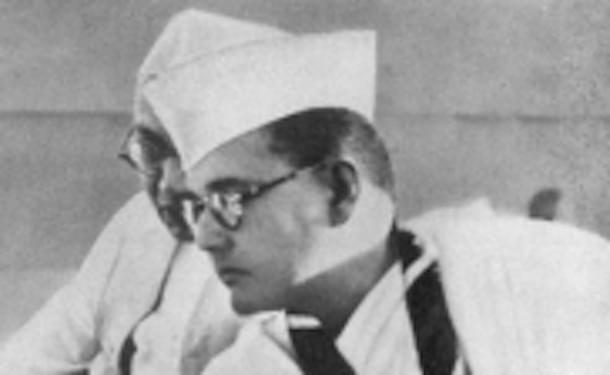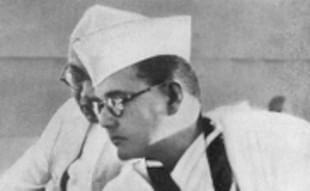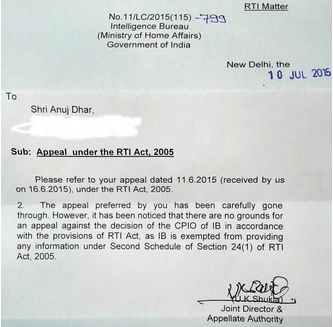Politics
IB Doesn’t Consider Snooping As Rights Violation
Anuj Dhar
Jul 24, 2015, 10:58 PM | Updated Feb 24, 2016, 04:32 PM IST
Save & read from anywhere!
Bookmark stories for easy access on any device or the Swarajya app.


The Intelligence Bureau refuses to give reasons for the snooping done on Netaji’s kin. Anuj Dhar’s struggle continues.
This is the year 2015, the era of the Right to Information, and the top intelligence agency seems to be caught up in a time warp. Or perhaps, the spooks are vary of skeletons tumbling out if this writer’s RTI request concerning snooping on the family members of Subhas Chandra Bose and others is accepted.
First, the latest news. The Intelligence Bureau will neither give reasons nor provide any details about the extensive surveillance mounted on the kin of Subhas Chandra Bose from the late 1940s to the late 1960s.
UK Shukla, Joint Director and the Appellate Authority, IB, has turned down my RTI appeal seeking overturn of IB’s initial denial of information. Unfortunately, like the IB Central Public Information Officer, the Appellate Authority too has adduced no proper reasons for stonewalling the information request.
“There are no grounds for an appeal against the decision of the CPIO,” writes Joint Director Shukla, and adds that the “IB is exempted from providing any information under Second Schedule of Section 24(1) of the RTI Act, 2005”.

This is when my appeal, as well as my original application, clearly states that “under the clause 24(1) of the RTI Act, the exemption given to the intelligence agencies is not applied in case of the ‘allegations of corruption and human rights violations’”.

And yet the Intelligence Bureau has repeated the same old line. I guess it must have factored in that there is not much I can do about this matter now. Some discussion over media, mostly online, will be of no consequence, from the IB’s point of view. My going to the Central Information Commission won’t bring any immediate comfort either, as nowadays it takes roughly two years before one’s appeal is heard by the commission due to workload.
Incidentally, the last time around I argued a matter regarding certain secret Netaji files before the Central Information Commission was the last year. The Chief Information Commissioner was a smart and unfriendly Rajiv Mathur, a former IB chief, who paid little attention to what I said. He upheld the PMO’s decision not to release the files. As I sat there under his cold gaze, I wondered whose bright idea it was to have a spook for the position of the Chief Information Commissioner of India.
So, here we have our IB brazening it out as it keeps under cupboard its skeletons relating to the illegal spying on the family members of Subhas Bose, whose “ghost” was chased by the sleuths till the 1970s at least.
But what exactly it is that the IB doesn’t want to disclose?
As was first highlighted by Swarajya in December 2014, for more than two decades two nephews of Subhas Chandra Bose, both of whom had played a role in the freedom struggle, were subjected to illegal surveillance by the West Bengal Intelligence Branch under the auspices of Intelligence Bureau in New Delhi.
![[The National Archives, New Delhi] (click to enlarge)](https://swarajya.gumlet.io/swarajya/2016-02/c0c59001-5254-4271-8673-5f2d6a83d62e/3-350x270.png?w=610&q=75&compress=true&format=auto)
![[The National Archives, New Delhi] (click to enlarge)](https://swarajya.gumlet.io/swarajya/2016-02/2ee98427-a920-4835-b7e5-48ad048ee16e/4-289x350.png?w=610&q=75&compress=true&format=auto)
![[The National Archives, New Delhi] (click to enlarge)](https://swarajya.gumlet.io/swarajya/2016-02/8cf57ae5-aa82-479e-aa1b-8b8a0afc997d/5.png?w=610&q=75&compress=true&format=auto)
![[The National Archives, New Delhi] (click to enlarge)](https://swarajya.gumlet.io/swarajya/2016-02/f11d4818-2a02-4e80-a7b9-72456cf7bfd0/6.png?w=610&q=75&compress=true&format=auto)
![[The National Archives, Kew (London)] (click to enlarge)](https://swarajya.gumlet.io/swarajya/2016-02/dd04046d-1b45-4a2b-a4fe-75f541226cac/7-303x350.png?w=610&q=75&compress=true&format=auto)
One such file (No 17/DG/83) is about journalist Hemandra Nath Pandit, who had dared to make some inquiry about the missing INA treasure. Two more files are about “Aims and Objectives of Netaji Research Bureau” and views of different political parties on the issue “whether Netaji Subhas Bose is still alive or not”. The latter was created in the year 1970.
File 15/D/87(13) is “regarding exploitation of Netaji’s name by political leaders and others”. Wouldn’t you want to who know these people were? But why must these files be created in the first place in free India? Does the IB have any file on aims and objectives of multiple institutes related to Pandit Nehru? Did the IB at any point in time intercept mails of other nation icons’ wives?
Just a few of many questions, whose answers the IB won’t let us have.
For more than a decade, Anuj Dhar has devoted himself to resolving the mystery surrounding the disappearance of Subhash Chandra Bose. His 2012 bestselling book India's Biggest Cover-up (Netaji Rahasya Gatha in Hindi) triggered the demand for declassification of the Bose files.





